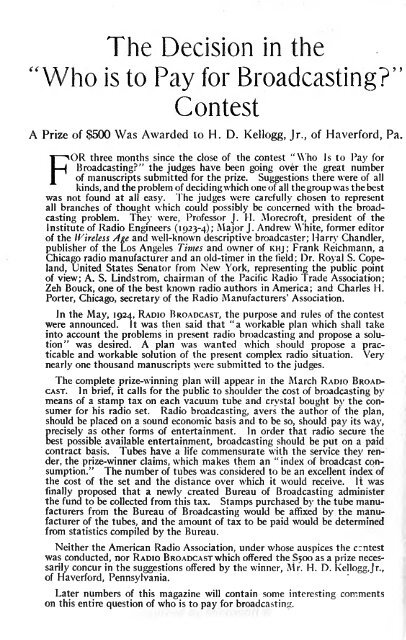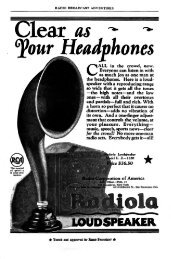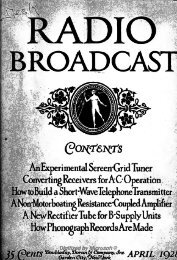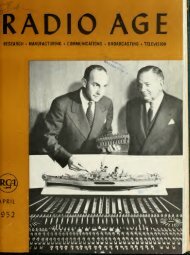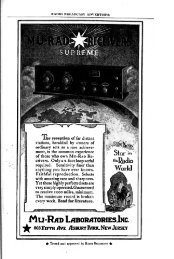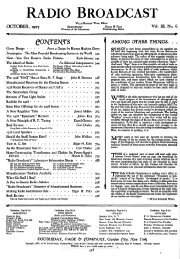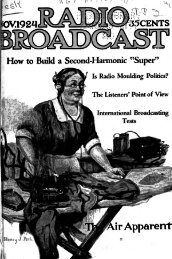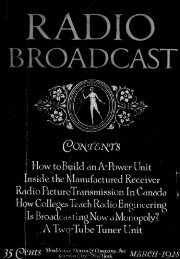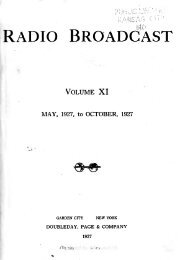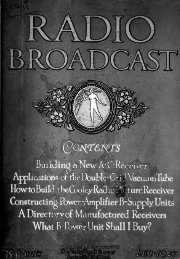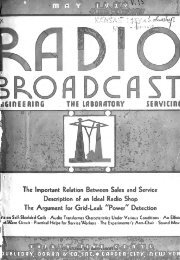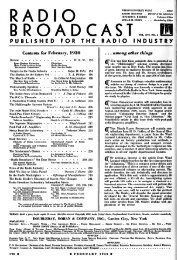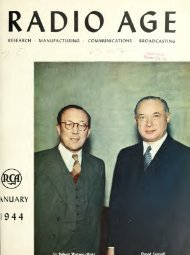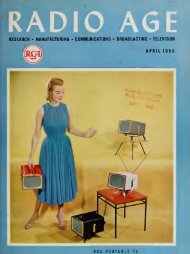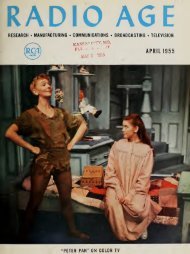Radio Broadcast - 1925, February - 113 Pages ... - VacuumTubeEra
Radio Broadcast - 1925, February - 113 Pages ... - VacuumTubeEra
Radio Broadcast - 1925, February - 113 Pages ... - VacuumTubeEra
You also want an ePaper? Increase the reach of your titles
YUMPU automatically turns print PDFs into web optimized ePapers that Google loves.
. .<br />
The Decision in the<br />
Who is to Pay for <strong>Broadcast</strong>ing"<br />
Contest<br />
A Prize of $500 Was Awarded to H. D. Kellogg, Jr.,<br />
of Haverford, Pa.<br />
three months since the close of the contest "\Yho Is to Pay for<br />
<strong>Broadcast</strong>ing"<br />
FOR<br />
the judges have been going over the great number<br />
of manuscripts submitted for the prize. Suggestions there were of all<br />
kinds, and the problem of deciding which one of all the group was the best<br />
was not found at all easy. The judges were carefully chosen to represent<br />
all branches of thought which could possibly be concerned with the broadcasting<br />
problem. They were, Professor J. H. Morecroft, president of the<br />
Institute of <strong>Radio</strong> Engineers (1923-4); Major J. Andrew White, former editor<br />
of the Wireless Age and well-known descriptive broadcaster; Harry Chandler,<br />
publisher of the Los Angeles Times and owner of KHJ Frank Reichmann, a<br />
;<br />
Chicago radio manufacturer and an old-timer in the field; Dr. Royal S. Copeland,<br />
United States Senator from New York, representing the public point<br />
of view; A. S. Lindstrom, chairman of the Pacific <strong>Radio</strong> Trade Association;<br />
Zeh Bouck, one of the best known radio authors in America; and Charles H.<br />
Porter, Chicago, secretary of the <strong>Radio</strong> Manufacturers' Association.<br />
In the May, 1924, RADIO BROADCAST, the purpose and rules of the contest<br />
were announced. It was then said that "a workable plan which shall take<br />
into account the problems in present radio broadcasting and propose a solution"<br />
was desired. A plan was wanted which should propose a practicable<br />
and workable solution of the present complex radio situation. Very<br />
nearly one thousand manuscripts were submitted to the judges.<br />
The complete prize-winning plan will appear in the March RADIO BROAD-<br />
CAST. In brief, it calls for the public to shoulder the cost of broadcasting by<br />
means of a stamp tax on each vacuum tube and crystal bought by the consumer<br />
for his radio set. <strong>Radio</strong> broadcasting, avers the author of the plan,<br />
should be placed on a sound economic basis and to be so, should pay its way,<br />
precisely as other forms of entertainment. In order that radio secure the<br />
best possible available entertainment, broadcasting should be put on a paid<br />
contract basis. Tubes have a life commensurate with the service they render,<br />
the prize-winner claims, which makes them an " index of broadcast consumption."<br />
The number of tubes was considered to be an excellent index of<br />
the cost of the set and the distance over which it would receive. It was<br />
finally proposed that a newly created Bureau of <strong>Broadcast</strong>ing administer<br />
the fund to be collected from this tax. Stamps purchased by the tube manufacturers<br />
from the Bureau of <strong>Broadcast</strong>ing would be affixed by the manufacturer<br />
of the tubes, and the amount of tax to be paid would be determined<br />
from statistics compiled by the Bureau.<br />
Neither the American <strong>Radio</strong> Association, under whose auspices the ccntest<br />
was conducted, nor RADIO BROADCAST which offered the $500 as a prize necessarily<br />
concur in the suggestions offered by the winner, Mr. H. D. Kellogg, Jr.,<br />
of Haverford, Pennsylvania.<br />
Later numbers of this magazine will contain some interesting comments<br />
on this entire question of who is to pay for broadcasting.


